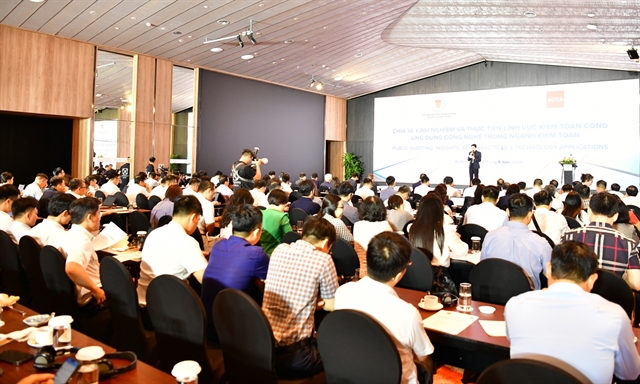 Economy
Economy


|
| View of the seminar. — Photo ACCA |
HÀ NỘI — The State Audit Office of Vietnam (SAV) and the Association of Chartered Certified Accountants (ACCA) on Thursday held a seminar to strengthen Việt Nam’s public audit for sustainable development.
At the seminar titled ‘Public auditing: insight, best practices & technology applications’ in Hà Nội, Deputy Auditor General Bùi Quốc Dũng said that new technology trends such as artificial intelligence (AI), big data, robotic process automation (RPA), and blockchain are fundamentally changing the way auditing is done.
The application of technology, especially AI, in public audit is an inevitable trend and needs to be implemented promptly.
“This is not only a requirement for Việt Nam to effectively integrate with international standards, but also a strategic opportunity to take shortcuts and get ahead in building a modern, transparent and high value-added public audit,” Dũng said.
According to Dũng, the SAV has begun piloting AI in thematic audits on investment, application of information technology software and IT service outsourcing activities for digital transformation in some localities. Initial results show that AI helps auditors analyse data quickly, automatically detect abnormalities and support the drawing of more objective and feasible conclusions. This is considered a breakthrough in auditing methods, from a manual approach to dealing with big data.
At the event, Bùi Hoàng Phương, deputy minister of Science and Technology, said: “We are witnessing the explosion of digital data. Enterprise Resource Planning (ERP) systems, electronic payment platforms and e-commerce transactions generate billions of transactions every day, which far exceed the ability to process manually. Random sampling, which is a common practice in auditing activities, is at risk of missing important violations. This requires auditing to shift from sampling to comprehensive analysis, where AI and machine learning become powerful assistants.”
According to Phương, society not only expects the auditing sector to detect errors but also to have the ability to warn of risks early, guide policies and provide management advice. This is a challenge that requires the auditing sector to have a combination of multi-dimensional data analysis and AI and machine learning-based predictive models.
“Digital transformation in auditing is not an option, but a vital requirement to build a modern governance. Therefore, the auditing industry needs to take more specific actions to promote digital transformation and apply AI technology,” Phương said.
He said that moving forward, the SAV needs to focus on building a digital transformation model with core components including digital infrastructure, digital data, digital auditing platform, intelligent analysis and forecasting platform, intelligent management and monitoring system.
At the event, the ACCA’s Director of Policy and Insights, Mike Suffield, offered reflections on the role of audit in enhancing public trust, policy coherence, and fiscal discipline.
“Public audit is no longer just about compliance. It must deliver assurance that public spending creates long-term value. By embedding technology, strengthening institutional capacity, and upholding ethical standards, Việt Nam’s audit sector can lead the way in shaping sustainable public finance,” said Suffield.
Drawing on global best practices and technology in public auditing, the event served as a platform to advance dialogue on how Việt Nam’s public audit practices can evolve in line with global standards, while strengthening transparency, accountability and the strategic role of audit in sustainable development. — BIZHUB/VNS